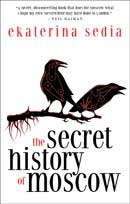

Prime Books, paperback, 9780809572236
The Secret History of Moscow is an urban fantasy set — as the title might lead you to suspect — in, and under, Moscow. This is the Moscow of the 1990s, when the grey but comforting certainties of life in the declining years of the Soviet regime were abruptly replaced with an uncertain new environment in which capitalists, gangsters, and gangster-capitalists operated; crippled Afghan war veterans begged in the street; and grinding poverty pressed up against new and conspicuous wealth.
In this new Moscow, people are disappearing. Galina's pregnant sister Masha gives birth in a locked bathroom and vanishes. With artist Fyodor and policeman Yakov, Galina investigates Masha's disappearance, discovering doorways between the quotidian Moscow and another world in which the dead, the desperate, and creatures from Russian folktales are at home. The path to find her sister is through this new world.
This fantasy is rooted in the real world. Ekaterina Sedia does a fine job of portraying the
squalid new Moscow that has sprung up from the failed hopes and faded grandeur of the old.
In her underground world, characters from legend and history come together in interesting
and unexpected ways:
"...several rusalki shod in heavy military boots filed out, followed by two soldiers circa
1917 or so.... Revolutionary and war heroes, led by the class enemy and several drowned girls.
Yakov decided not to contemplate further."
That said, I found the underground world itself something of a disappointment: apart from a couple of locations, I never gained a clear sense of what it looked, smelled, or felt like. This might not have been a problem had I been more familiar with the characters from Russian folklore who inhabit it, but thinness of description makes the middle third of the novel the least satisfying to me.
Things pick up again, however, once the underground dwellers return — as it was clear they
were going to have to do — to the surface. In my experience, the ending is the hardest part
of a novel to get right: here, Ekaterina Sedia triumphs, resolving the personal quest with
which the novel began in a manner that is both moving and appropriate. Not the perfect novel,
then, but if you enjoy fantasy and are looking for a story that doesn't follow the usual
well-worn fantasy routes, then you should investigate The Secret History of Moscow.